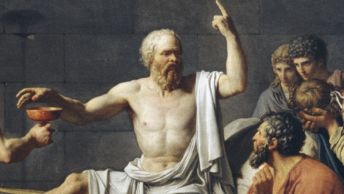I attended a wedding in New York City by myself well over 40 years ago. So at the reception at the Tavern on the Green in Central Park, I was seated at a table of friends of the bride’s family. Since I didn’t know any of them and was suffering from terminal shyness I didn’t offer anything to the conversation. But I did listen intently to the comments of these middle-aged married couples. One husband in particular said: Just because there is a little snow on the roof, doesn’t mean there isn’t a fire in the basement.
I think I understood what he meant and as I have gotten older, much older, I have come to appreciate his comments even more.
In retrospect I think there is much more meaning hidden in his comments than basic allusion to age and libido. His words were almost axiomatic to me in that just because one has aged, it does not eliminate him or her from the full joys of livings—all the joys of living…not just sexuality. Our hormones work on many levels, not just below the belt. We should try to maintain that fire in the belly for life, not just sex.
Years after that wedding, I read Sister Joan Chittister’s book Uncommon Gratitude, which says that we should issue an Alleluia to each new day and accept it as God’s special gift for us to dig, mine and prod until we have sucked all the marrow out of its bones. This is a Christian twist on Roman poet Horace’s mandate to Carpe Diem….seize the day!
Most people would probably not recognize this classic phrase had it not been for the untimely suicide of actor-and-comedian Robin Williams and the reprise of his most popular role as the unorthodox prep school teacher, John Keating, in Dead Poets Society. After his death in 2014, I saw the film for the third time on my DVD player. I easily understood Keating’s enthusiasm and love of teaching. He wanted his students–all very bright young men–not to be forced into square holes by parents, their school or the culture at large. He advised them to go for the gusto as Budweiser beer used to promote.
The only problem and one he tragically failed to fully comprehend is that a room full of young men will often seek not the truth and beauty that may have been on his fertile mind but the pleasurable and hormonal experiences of the flesh. Keating also did not take into consideration that at such an early age his students would not be able to properly understand or handle the emotional consequences of their seizing of the day.
Where Keating failed his students was in not telling them they had some necessary prerequisites before the marrow could be even tasted. His students first needed to learn discernment, self-discipline and good judgment. In other words they needed emotional maturity. One of his students’ suicide illustrated his blundering.
Traditional society has tried to regulate and channel with mixed results these sexual urges in young men especially for centuries. A teacher like Keating is their worst enemy and greatest fear. Fools will always rush in where angels fear to tread is no cliché.
When I was in high school we studied a similar idea, found in Robert Herrick’s poem, To the Virgins, to Make Much of Time.
Gather ye rosebuds while ye may,
Old Time is still a-flying:
And this same flower that smiles to-day
To-morrow will be dying.
The glorious lamp of heaven, the sun,
The higher he’s a-getting,
The sooner will his race be run,
And nearer he’s to setting.
That age is best which is the first,
When youth and blood are warmer;
But being spent, the worse, and worst
Times still succeed the former.
Then be not coy, but use your time,
And while ye may, go marry:
For having lost but once your prime,
You may forever tarry.
I doubt if there were ever any more seductive poem than Herrick’s revival of the Carpe Diem genre. Of the 17th century bachelor’s 2500 poems, this is the best remembered. The overriding message of Herrick’s work is that life is short, the world is beautiful, love is splendid, and we must use the short time we have to make the most of it.
The major problem with this way of thinking and living is that it too quickly turns to hedonism and the consequences can often be tragic as in the young man’s death in the Williams movie. In my mind the idea of Carpe Diem, especially in our society, is totally false. Thanks to science and medical technology most lives are not short and fleeting for all but drug addicts. Most people can look forward to 80-90 years of substantially active and happy living.
Baseball great Mickey Mantle lamented near the end of his sixty-four-year life that had he knew he would have lived as long as he did, he would have taken better care of himself. No male member of his family had lived past age forty. The family history of working in the zinc mines in Oklahoma was largely responsible for that. As a nineteen-year-old player Mantle had gone for all the gusto he could swallow and became an alcoholic in the mix.
Youth indeed is wasted on the young. I think the idea of Carpe Diem should be reserved for the elderly in their golden years. By that time their family responsibilities have usually been fulfilled. At their age, they should have emotional maturity necessary for good judgment. If they have taken good care of themselves and sexual urges do not seem as demanding then these are the years to go for the gusto and enjoy each day like it might be the last day on earth…because it very well may be.
Sister Chittister and her co-author Rowan Williams, the Archbishop of Canterbury, have another suggestion. They believe that gratitude should dominate our waking hours as we grow closer to our divine destination. The authors cite several of the usual things that we should be naturally grateful for, such as God, peace, wealth, health, faith, family and friends. But they take the gratitude even further. We should thank God for everything that happens to us. This includes even our daily crosses of physical and emotional sufferings, which should be met with a joyful Alleluia.
To them life is an exercise in learning just how to sing Alleluia here so that we can recognize the face of God hidden in the deep recesses of time. Some quiet reflection should help us see that the past is never gone from us. Our past lives with its joys, sufferings and challenges have made us what and who we are.
Old age then is also a time for a reflection on the past to see how it has shaped our present lives and to understand the providential links that have brought us to this time in the eternal scope of things. Teachers (and I can say writers and coaches as well, since I have done all three) often never see the results of their efforts in shaping the minds, hearts and souls of the young people who briefly cross their paths. Yes, this is heavy mental stuff; however, if we don’t do it we run the dark risk of failing to see the importance of our lives to those around us.








